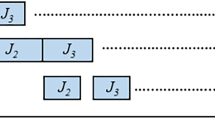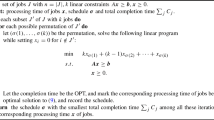Abstract
In this paper we consider the maximization of the weighted number of early jobs on a single machine with non-availability constraints. We deal with the resumable and the non-resumable cases. We show that the resumable version of this problem has a fully polynomial time approximation scheme (FPTAS) even if the number of the non-availability intervals is variable and a subset of jobs has deadlines instead of due dates. For the non-resumable version we remark that the problem cannot admit an FPTAS even if all due dates are equal and only one non-availability interval occurs. Nevertheless, we show in this case that it admits a polynomial time approximation scheme (PTAS) for a constant number of non-availability intervals and arbitrary due dates.
Similar content being viewed by others
References
Gens GV, Levner EV (1978) Approximation algorithms for certain universal problems in scheduling theory. Eng Cybern 16:31–36
Gens GV, Levner EV (1981) Fast approximation algorithms for job sequencing with deadlines. Discrete Appl Math 3:313–318
Kacem I, Kellerer H (2011) Fast approximation algorithms to minimize a special weighted flow-time criterion on a single machine with a non-availability interval and release dates. J Sched 14:257–265
Kellerer H, Strusevich VA (2006) A fully polynomial approximation scheme for the single machine weighted total tardiness problem with a common due date. Theoret Comput Sci 369:230–238
Lawler EL, Moore JM (1969) A functional equation and its application to resource scheduling and sequencing problems. Manage Sci 16:77–84
Lee C-Y (1996) Machine scheduling with an availability constraint. J Global Optim 9:363–382
Lee C-Y (2004) Machine scheduling with availability constraints. In: Leung JY-T (ed) Handbook of scheduling: algorithms, models and performance analysis. Chapman & Hall/CRC, London, pp 22-1–22-13
Ma Y, Chu C, Zuo C (2010) A survey of scheduling with deterministic machine availability constraints. Comput Ind Eng 58:199–211
Pinedo M (2012) Scheduling: theory, algorithms and systems, 4th edn. Springer, New York
Potts CN, van Wassenhove LN (1992) Approximation algorithms for scheduling a single machine to minimize total late work. Oper Res Lett 11:261–266
Sahni S (1976) Algorithms for scheduling independent tasks. J Assoc Comput Mach 23:116–127
Sahni S (1977) General techniques for combinatorial approximation. Oper Res 25:920–936
Schmidt G (2000) Scheduling with limited machine availability. Eur J Oper Res 121:1–15
Acknowledgments
This work has been supported by Programme PHC AMADEUS 2012 (Project No. 25086PL).
Author information
Authors and Affiliations
Corresponding author
Rights and permissions
About this article
Cite this article
Kacem, I., Kellerer, H. & Lanuel, Y. Approximation algorithms for maximizing the weighted number of early jobs on a single machine with non-availability intervals. J Comb Optim 30, 403–412 (2015). https://doi.org/10.1007/s10878-013-9643-7
Published:
Issue Date:
DOI: https://doi.org/10.1007/s10878-013-9643-7




